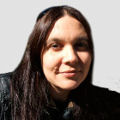Fern Elsdon-Baker
This article originally appeared in The Guardian “Comment Is Free” web-site on 20 October 2011 and is reproduced here by permission.

Dr Fern Elsdon-Baker studied environmental sciences before going on to complete her doctoral studies in the history and philosophy of evolutionary theory. Her ongoing research interests focus on the history and communication of theories of heredity in relation to Darwinism and neo-Darwinism from the mid-19th century to the present day. She is also the programme director for Belief in Dialogue the British Council’s programme of activity aimed at developing understanding between different communities on issues of diversity and culture
‘It is a misconception to assume that being religiously minded means an inherent rejection of a scientific method or approach to understanding the world around us.’
A respected friend and scientific academic colleague confided in me last week that she didn’t feel able to tell people in the science community that she was a Christian. It was an assertion, she felt, which would lead other colleagues to assume she was in some way stupid.
Her “coming out” as a Christian struck a chord with me because, to a large extent, it mirrored my own experiences of how faith is often portrayed by those whose job it is to communicate science. It is also indicative of how many young scientists are beginning to feel about their personal faith.
Now it is at this point in any discussion about the science v religion debate that I have to declare my own position: I am an atheist and unquestionably pro-science. It is actually a point of some consternation that I do feel the need to state this because, quite frankly, what I do or do not believe is my own business.
How I chose to define myself in terms of identity markers should be inconsequential to my career as a science communicator and academic. In fact reading down my own personal top 10, atheist comes at the very bottom after woman, British, partner, daughter, sister, friend, academic, sci-fi geek and Marmite lover.
Up until a few years ago I felt no need to articulate my atheism as a facet of my identity within my work. It is only since the “new atheism” narrative took hold, one which has come to demarcate a rather intolerant and simplistic view of the world, that I have felt compelled to talk about my own perspective lest I am accused of being a secret creationist theologian for seeking an open dialogue around science and belief.
Ironically, I have also become increasingly ashamed to even mention my atheist world view in case others assume it means I am in some way discriminatory of their beliefs.
Although many may not recognise it there exists at the heart of the science-religion debate more than one ideology driving the conflict.
The dominant narrative in the debate tells us that the problem lies firmly with the theology camp. That those who cling to outdated, anti-rational beliefs are responsible for driving the so-called “clash” of world views in contemporary society.
The less familiar narrative and certainly the one responsible for relegating my friend’s beliefs into the realm of guilty secrets is that ideology that exists at the opposite end of the spectrum. It is an extreme and fundamentalist form of scientism, one which is frequently linked to the new atheist agenda.
Does being a Christian mean you can’t do science? Well some might argue this but then those same people tend to argue that science is an objective and not a subjective endeavour; one that cannot be influenced by the individual scientist’s perspective. We are, after all, observing the same universal phenomena or so the argument goes.
But then you can’t have it both ways. There can’t be a necessary clash between a scientific and a religious perspective on the one hand a need for a marching band of atheistic “true scientists” and conversely an assertion that there is universal objective activity of scientific knowledge production on the other.
Science is a fundamental part of society both past and present. It is a misconception to assume that being religiously minded means an inherent rejection of a scientific method or approach to understanding the world around us. To take this path lends itself to the ridiculous and totally ahistorical assumption that religious teaching has always been, and should continue to be, anti-scientific. Or that science communication should be inherently anti-religious.
This can only fuel the growing sense that science far from being a beneficial endeavour for all humankind is actually is a “western” ideology; another weapon in the “us” and “them” arsenal that has so negatively dogged public discourse since 9/11.
This is an appropriation of science communication in a way that at its very core is more about bigotry than a representation of the truly international and collaborative way that science is conducted.
We ignore the creep of this insidious narrative at our peril because what is at stake here is the foundation for a more tolerant global society. I don’t doubt there are those who would use a religious perspective to argue against scientific theories though here I would argue that these views do not necessarily represent the mainstream my point is more that it takes two to tango.
The views expressed in this piece are the personal views of the author and not those of the British Council



